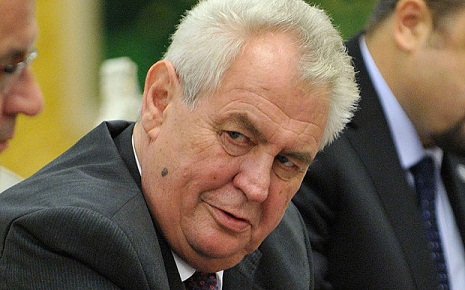“I’m not going to allow any ambassador to interfere with my travel plans,” Mr. Zeman told a local news agency.
President Zeman plans to be in Moscow on May 9—likely as the sole Western head of state—to stand alongside Russian President Vladimir Putin and North Korean supreme leader Kim Jong Un observing a large military parade to honor the Russian military for its role in the victory over Nazi Germany in World War II.
Most Western leaders are likely to stay away from the event because of Russia’s annexation of Crimea from Ukraine and its support for rebels in Ukraine’s east. German Chancellor Angela Merkel will visit the Russian capital May 10, the day after the parade.
Andrew Schapiro, U.S. Ambassador to the Czech Republic, earlier in the week told Czech Television he recognizes the Russian contribution to freeing parts of Europe from Nazi occupation 70 years ago, but added the symbolism of Mr. Zeman “standing on a platform reviewing a [Russian] military parade at a time when that military is destabilizing a European nation is not really a good message to send.”
When asked whether he would invite the ambassador to his office at Prague Castle to talk through the situation, Mr. Zeman said “I’m afraid that after this statement doors to the Castle are closed for Ambassador Schapiro.”
Mr. Zeman calls Ukraine conflict a civil war and has offered little support to the Czech Republic’s allies in the North Atlantic Treaty Organization amid Russian militarily provocations in Northern Europe.
The U.S. embassy had no immediate comment.
Mr. Schapiro, who is in the U.S. for the Easter holiday, had a limited reaction to the situation, with his Twitter account saying he was surprised with the development.
Mr. Zeman’s comments drew criticism from across the Czech political spectrum.
Jaroslav Faltynek, a senior member of ANO, one of three parties in the country’s coalition government, called Mr. Zeman’s statement “unnecessarily inflammatory.”
Karel Schwarzenberg, chairman of right-leaning opposition party TOP 09 and a former foreign minister, said “of course the ambassador can express his opinion or criticism.”
Slovak President Andrej Kiska, who is taking a harder line on Moscow, on Saturday said Russia bears responsibility for what is happening in Ukraine and that it is up to Russia to withdraw fighters from Ukraine’s east and that the Kremlin must uphold cease-fire agreements.
More about:
















































